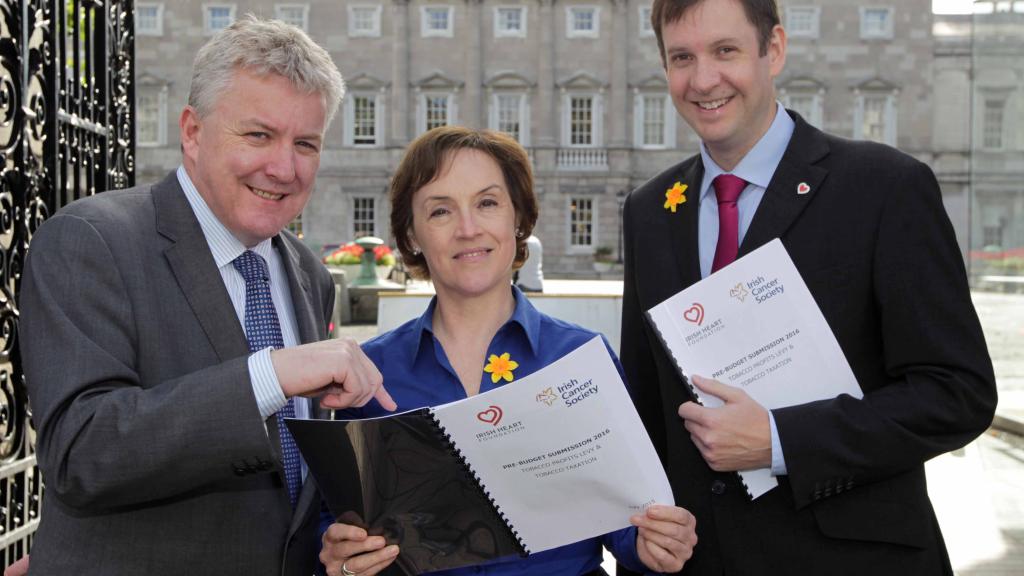
Levy on €150 million annual tobacco profit should be used to help smokers quit
A new levy should be introduced to force tobacco companies enjoying profit margins of up to 60% on cigarette sales in Ireland to pay the cost of helping smokers to quit. We have called for the levy in our pre-budget submission with the Irish Heart Foundation.
We have also called for the introduction of annual tax increases on tobacco products set at 5% above the rate of inflation, which this year would result in a 50 cent price hike on a pack of cigarettes.
Research carried out for the Irish Cancer Society and Irish Heart Foundation by leading UK business economist Dr Rob Branston of the University of Bath shows that tobacco multinationals are making combined annual profits of between €110 million and €150 million from Irish sales.
This is gained from profit margins of 60% for Japan Tobacco International, which controls over half the Irish market, 41% for Imperial Tobacco and 24% for British American Tobacco – way higher than the normal profit margins for consumer staple industries of between 12-20%.
A 25% levy on tobacco industry profits could yield up to €38 million in additional receipts to the Exchequer – which is around double the amount currently being spent by the State on assisting smokers to quit.
Chris Macey of the Irish Heart Foundation said it defied reason that companies whose products are responsible for the deaths of over 5,000 people and cost an estimated half a billion euro in direct health expenditure alone every year are then allowed to extract excessive profits out of Ireland.
He said: “In effect the State is subsidising an industry that is killing large numbers of its citizens. We believe tobacco companies should be held to account and forced to pay the price of helping people to quit and should also contribute more to the cost of the health catastrophe they continue to inflict on the people of this country.”
Kathleen O’Meara of the Irish Cancer Society added: “Permitting such high levels of profit also creates an incentive for powerful tobacco multinationals to fight measures such as plain packaging legislation that hit them in the pocket by reducing smoking rates and discouraging young people from starting to smoke.”
She said that by also diverting some of the extra revenue to fighting tobacco smugglers, the Government could achieve the double whammy of reducing the smoking rate and tackling the illicit trade at no extra cost to the Exchequer.
Ms O’Meara continued: “The smoking rate among Irish adults has fallen below the 20% mark for the first time since records began – that’s around 250,000 fewer smokers now than in 2009. But to maintain the trend we have to do more to help smokers quit and we are proposing that nicotine replacement therapy be made available free of charge to everyone enrolled in smoking cessation programmes.”
According to Dr Branston, tobacco multinationals can continue to charge premium prices and make excessive profits because their products are very cheap to make, are highly addictive, and competition in such a highly regulated market is so limited. “A levy would start to address the massive level of profit being earned at the expense of Irish consumers. Furthermore, such a levy could also help facilitate a longer term move towards the direct regulation of tobacco prices which would be even more beneficial,” he said.
The recommendations in the submission are:
1) Introduce a levy on tobacco industry profits, with revenue used to support smokers to quit.
2) Introduce an annual tobacco tax escalator (inflation + 5%), which would require a tax increase of approximately 50 cent in Budget 2016.
3) Increase tax levels on roll‐you‐own tobacco until they are equivalent to those on cigarettes.
4) Make NRT (nicotine replacement therapy) available free of charge to all those enrolled in smoking cessation programmes.
5) Publish the delayed Revenue Commissioner’s smuggling strategy to include:
- A clear target for reducing the size of the illicit market
- Increased resources (staffing and funding) for investigations
- More effective control of tobacco industry supply chains
Find out more about our fight against tobacco.
